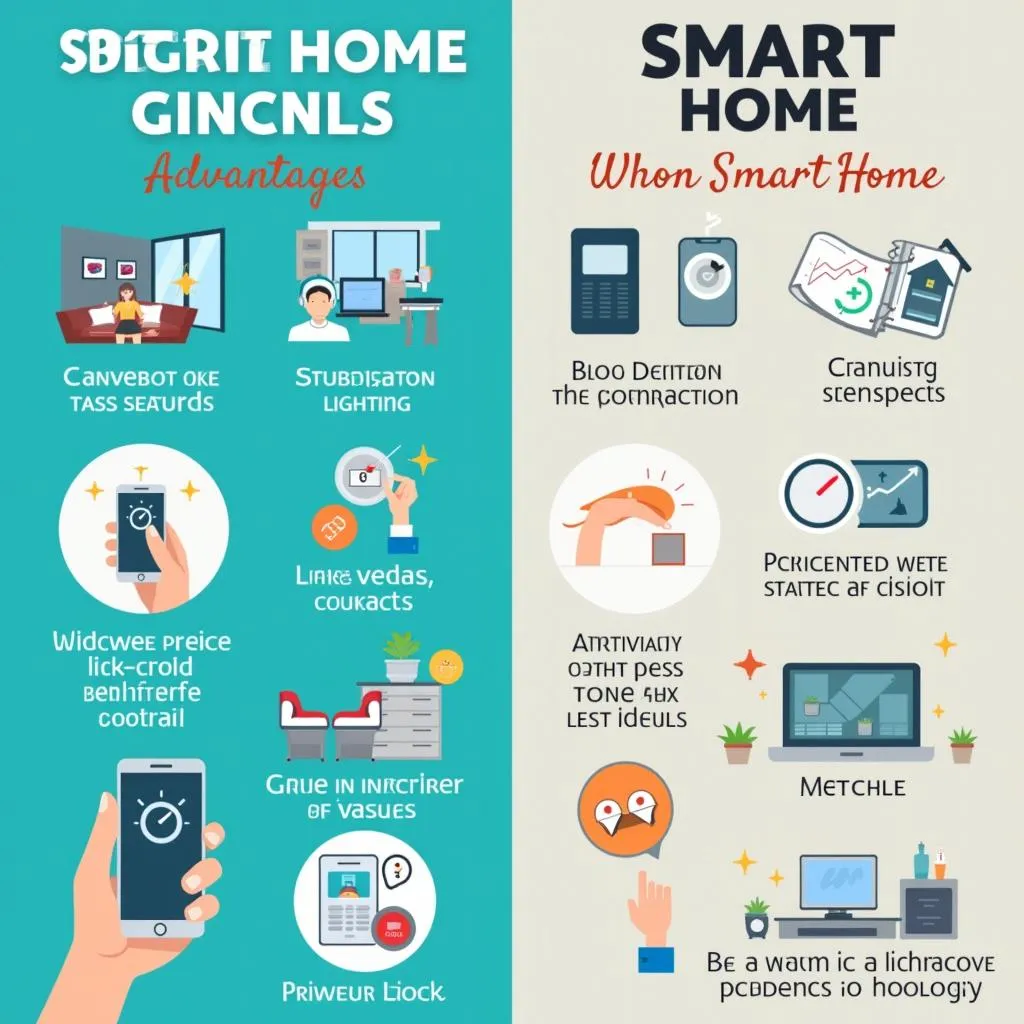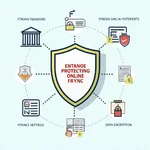Smart homes and their impact on daily life have become increasingly prevalent topics in IELTS Writing Task 2 essays. This subject intersects with technology, lifestyle, and societal changes, making it a rich area for discussion. Based on recent trends, we can expect to see more questions related to smart homes in future IELTS exams. Let’s explore a sample question that has appeared in past tests and analyze how to approach it effectively.
Some people think that smart homes with interconnected devices and appliances will improve our lives, while others think it will cause problems. Discuss both views and give your own opinion.
Analyzing the Question
This question falls under the “discuss both views and give your opinion” category. It requires candidates to:
- Explore the positive aspects of smart homes
- Examine potential problems associated with smart homes
- Present a balanced argument
- Provide a personal opinion supported by reasoning
Let’s look at sample essays for different band scores to understand how to tackle this question effectively.
Sample Essay 1 (Band 8-9)
The concept of smart homes, where various devices and appliances are interconnected, has gained significant traction in recent years. While some believe this technological advancement will enhance our quality of life, others argue it may lead to unforeseen complications. This essay will examine both perspectives before presenting my own viewpoint.
Proponents of smart homes argue that these interconnected systems can significantly improve our daily lives. Firstly, smart homes offer unprecedented convenience and efficiency. For instance, refrigerators can automatically order groceries when supplies run low, while thermostats can learn occupants’ preferences and adjust temperatures accordingly, optimizing energy consumption. Moreover, smart security systems provide enhanced safety, allowing homeowners to monitor their property remotely and receive instant alerts in case of any suspicious activity.
However, critics raise valid concerns about the potential drawbacks of smart homes. One major issue is the risk to privacy and data security. With multiple devices collecting and sharing personal information, there is an increased vulnerability to cyberattacks and data breaches. Additionally, over-reliance on technology may lead to a loss of basic skills and reduced human interaction. For example, individuals might become less adept at performing simple tasks manually or may prefer communicating with their smart devices rather than engaging with family members.
In my opinion, while smart homes undoubtedly offer numerous benefits, it is crucial to approach their implementation with caution. The advantages in terms of convenience, energy efficiency, and security are significant and can greatly enhance our quality of life. However, we must also be vigilant about protecting our privacy and maintaining a balance between technological assistance and human capabilities.
In conclusion, smart homes present both opportunities and challenges. By addressing the concerns related to data security and consciously preserving essential human skills and interactions, we can harness the benefits of this technology while mitigating its potential negative impacts. Ultimately, the key lies in striking a balance between embracing innovation and maintaining our core human values.
(Word count: 309)
 Smart home technology advantages and disadvantages
Smart home technology advantages and disadvantages
Essay Analysis
This essay demonstrates several qualities that contribute to its high band score:
-
Clear structure: The essay follows a logical structure with a clear introduction, body paragraphs discussing both views, and a conclusion that summarizes the main points and presents a balanced opinion.
-
Cohesion and coherence: The ideas flow smoothly, with appropriate use of linking words and phrases (e.g., “Firstly,” “Moreover,” “However,” “Additionally”).
-
Lexical resource: The essay employs a wide range of vocabulary relevant to the topic (e.g., “unprecedented convenience,” “optimize energy consumption,” “vulnerability to cyberattacks”).
-
Grammatical range and accuracy: The writer uses a variety of complex sentence structures accurately (e.g., “While some believe… others argue…,” “By addressing the concerns… we can harness the benefits…”).
-
Task response: The essay fully addresses all parts of the question, discussing both views and providing a clear personal opinion with supporting arguments.
Sample Essay 2 (Band 6-7)
Smart homes with connected devices are becoming more popular these days. Some people think they will make our lives better, but others worry about problems. This essay will look at both sides and give my opinion.
On the positive side, smart homes can make life more convenient. For example, you can control lights and heating with your phone, which saves time and energy. Smart fridges can tell you when you need to buy more food, and security cameras can help you watch your house when you’re away. These things can make daily life easier and safer.
However, there are also some potential problems with smart homes. One big issue is privacy. When all your devices are connected to the internet, there’s a risk that someone could hack them and steal your personal information. Another problem is that people might become too dependent on technology. If the smart system breaks down, they might not know how to do simple things like turning on the lights manually.
In my opinion, smart homes have both good and bad points. I think the benefits of convenience and energy saving are important, but we need to be careful about privacy and not forgetting basic skills. We should use smart technology in a balanced way.
To conclude, smart homes can improve our lives in many ways, but we should also be aware of the potential problems. It’s important to use this technology wisely and not let it take over every aspect of our lives.
(Word count: 253)
 Smart home security system interface
Smart home security system interface
Essay Analysis
This essay demonstrates characteristics typical of a Band 6-7 score:
-
Structure: The essay has a clear structure with an introduction, body paragraphs discussing both views, and a conclusion. However, the development of ideas is less sophisticated compared to the Band 8-9 essay.
-
Cohesion and coherence: The essay uses some linking words (e.g., “However,” “To conclude”), but the connection between ideas could be smoother.
-
Lexical resource: The vocabulary is adequate for the task, but less varied and precise compared to the higher band essay. Some topic-specific terms are used (e.g., “connected devices,” “security cameras”).
-
Grammatical range and accuracy: The essay uses a mix of simple and complex sentences with generally good accuracy, but lacks the sophistication of the Band 8-9 essay.
-
Task response: All parts of the question are addressed, but the arguments and examples are less developed compared to the higher band essay.
Key Vocabulary
Here are some important vocabulary items used in the essays, along with their definitions:
-
Interconnected (adjective) /ˌɪntəkəˈnektɪd/: Connected with each other.
-
Traction (noun) /ˈtrækʃn/: The extent to which an idea, product, etc. gains popularity or acceptance.
-
Unprecedented (adjective) /ʌnˈpresɪdentɪd/: Never having happened or existed before.
-
Vulnerability (noun) /ˌvʌlnərəˈbɪləti/: The quality or state of being exposed to the possibility of being attacked or harmed.
-
Cyberattack (noun) /ˈsaɪbərəˌtæk/: An attempt to damage, disrupt, or gain unauthorized access to a computer system or network.
-
Vigilant (adjective) /ˈvɪdʒɪlənt/: Keeping careful watch for possible danger or difficulties.
-
Mitigating (verb) /ˈmɪtɪɡeɪtɪŋ/: Making (something bad) less severe, serious, or painful.
-
Harness (verb) /ˈhɑːrnəs/: Control and make use of (natural forces or power).
Conclusion
The topic of smart homes and their impact on our lives is likely to remain relevant in future IELTS Writing Task 2 questions. To prepare effectively, practice writing essays on related themes such as:
- The impact of artificial intelligence on daily life
- The benefits and drawbacks of internet-connected devices
- Privacy concerns in the digital age
- The role of technology in home management and energy efficiency
Remember to structure your essay clearly, use a range of vocabulary and grammatical structures, and provide relevant examples to support your arguments. By doing so, you’ll be well-prepared to tackle any question related to smart homes and technology in your IELTS Writing Task 2.
We encourage you to practice writing an essay on this topic and share it in the comments section below. This active practice will help you improve your writing skills and prepare more effectively for your IELTS exam.
The impact of technology on communication is another closely related topic you might want to explore to broaden your understanding of technology-related IELTS questions. Additionally, considering the pros and cons of living in urban vs. rural areas can provide valuable insights into how smart home technology might differently affect various living environments.


